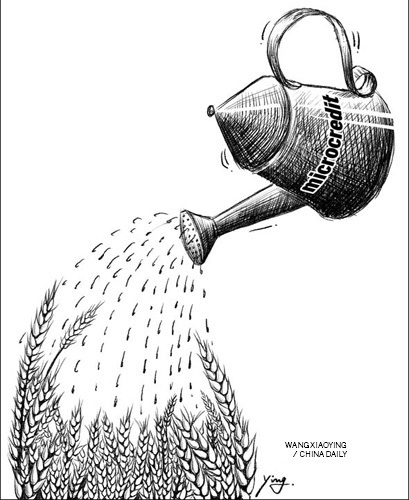Op-Ed Contributors
Microcredit could bring macro gains
By MICHELE GERACI (China Daily)
Updated: 2010-03-26 07:51
 |
Large Medium Small |
Over the past several years, microcredit has been used in many countries as a tool to alleviate poverty and offer low-income individuals and families access to credit facilities, otherwise denied by mainstream banking institutions. Generally speaking, microcredit consists of small-loans (from a few hundred to a few thousand dollars) both to individuals and micro-enterprises mostly in rural, but also in urban, areas without the need for collaterals.
Since its launch in the 1970s microcredit has raised the living condition of millions of people and fostered sustainable development. And as recognition of its effectiveness, Prof Muhammad Yunus, founder of Grameen Bank in Bangladesh which pioneered microcredit, was awarded the Nobel Peace Prize in 2006.
| ||||
Micro-loans could be used by Chinese farmers to buy seeds, fertilizers, small machinery and vehicles. They could be used for other small investments and children's education, too, which would help the poor to earn more and live a better life, and help narrow the income gap between urban and rural residents, and between the high-income and low-income city dwellers.
I have visited many rural areas of Sichuan province and spoken with some farmers who have access to microcredit, and seen an encouraging picture of satisfaction and harmonious cooperation with the lending organizations.
But despite a great deal of efforts, some success stories and new government regulations and policies (like the recently published Document No1) aimed at developing the rural areas, the microcredit industry in China has not developed to its full potential. Only about one-third of the rural population has access to some sort of credit service, though not all of it is microcredit. This leaves a large untapped demand because many people don't have access to basic financial services. The bottleneck is, therefore, on the supply side.
Three factors are responsible for this. First, NGOs in China are focused on serving a social mission. Second, regulations on microcredit companies' (MCC) setup and operations are too restrictive to allow them to run in an economically viable manner. And third, large, established banks find it difficult to scale down their operations to serve the lower end of the market.
It's true, NGOs can rely only on donations for their "capital", but China is not perceived as a key international destination for aid/donor funds. China's current trade tensions with the West and its huge foreign reserves have strengthened the belief that it does not need foreign aid. Besides, MCCs are not allowed to accept customer deposits and thus have to rely on the more expensive open market mechanisms to get their funds. This limitation seriously impairs their ability to make profit and offer good enough returns to investors.
As a former long-term investment banker and sponsor of charity ventures, I believe the initial enthusiasm for a cause fades away quickly in the absence of economic advantage. So I advocate a restructuring of China's microcredit industry and the pursuit of a double-bottom line approach. This means lending institutions should be made to fulfill the job of social missions to help low-income people and contribute to the development of the rural economy. At the same time, regulations should be relaxed to enable MCCs to achieve financial long-term sustainability. These suggestions may sound ambitious, but they can hopefully be used as a road map for China's microcredit services.
I propose the creation of a new legal company, too, which would be regulated by a regulatory body independent of the China Banking Regulatory Commission. Such a company should be allowed to accept customer deposits up to 50 percent of the total equity and be able to borrow more funds from banks. This is a necessary condition to offer adequate returns to investors.
I know policymakers will be worried over the safety of customers' deposits. But the new companies would be 10 times financially safer than what are considered solid banks according to regulatory standards and risk of defaulting on deposits will be minimum. Having a proper loan risk management in place would further reduce such residual risks. Moreover, holding deposits within MCCs will mitigate existing informal lending practices that lead to fraud and will actually make deposits safer than they are today.
The requirement for minimum registered capital for MCCs should be lowered to 500,000 yuan so that more players and small entrepreneurs can enter the market and capital can be more effectively used to provide loans to customers instead of sitting idle in the company's bank accounts. In addition, concession areas should be extended from the county to the provincial level to achieve economies of scales and improve the risk profile in times of natural disasters.
To offer true microcredit services, the maximum loan size should be capped at a customer's annual income and a maximum of a few tens of thousands of yuan.
Although not explicitly forbidden, money from abroad does not find its way into the sector easily, so foreign capital should be encouraged to enter the sector. Fears that this would cause excessive hot money to flow into China should played down because the sector is too small to let that happen. And even if hundreds of millions of US dollars were to pour in, it would still be small compared to the current FDI level of $90 billion a year. The post-global financial crisis period is a good time to open the door because foreign investors are seeking new avenues to make money.
There is also the need to harmonize regulations across China and eliminate existing individual provincial sub-policies. At present, every province sets its own rules, leading to a paradox whereby richer coastal provinces (such as Zhejiang) impose tighter requirements even if they have fewer low-income families and thus a smaller MCC market. A uniform countrywide rule will offer enhanced clarity to microcredit practitioners and investors both.
Most industries around the world are run only to make profit. All things considered, there is no obvious moral contradiction if they do so while fulfilling a social mission.
The author is head of China Program at the Global Policy Institute of London Metropolitan University and visiting scholar at Zhejiang University.

(China Daily 03/26/2010 page9)











